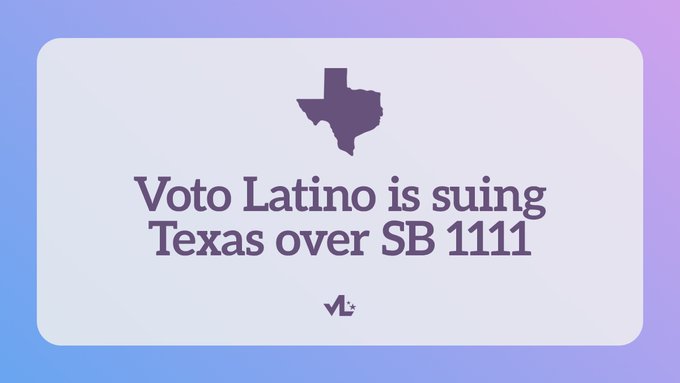
LULAC and Voto Latino sue six Texas counties over new law restricting voter access to polls
Two advocacy groups focused on expanding Latino voter access have sued multiple Texas counties over Senate Bill 1111, which restricts voters’ access to the polls based on the type of address they use on their registration form.
The League of United Latin American Citizens (LULAC) of Texas and Voto Latino have sued officials in six counties — Travis, Bexar, Harris, Hidalgo, Dallas, and El Paso — over the implementation of the bill, claiming it is in violation of the 1st, 14th and 26th Amendments.
The lawsuit intends to prevent the officials from placing the provisions into effect, which is set to start on Sept. 1.
LULAC and Voto Latino’s work includes voter education, registration and civic engagement campaigns aimed at Texas Latino voters.
According to the joint complaint, SB 1111 will force the groups to “expand and divert additional funds and resources” to combat the bill’s impact on its main constituents, and to assist the demographic in navigating the various added hurdles that hinder access to the polls and “silence the voices of Latinx voters.”
ICYMI: Texas State @LULAC and @votolatino SUED Texas over voter suppression bill #SB1111, claiming that the new residency requirements in the bill will harm young and minority voters in violation of the 1st, 14th, and 26th Amendments. https://t.co/uv9Ay8fx1r
— Democracy Docket (@DemocracyDocket) June 23, 2021
Under SB 1111, Texas voters are not permitted to establish residence for the purpose of influencing the outcome of elections, using previous residences as their home address for registration purposes (even if they consider those residences to be their home).
It also requires additional documentation for voters who use P.O boxes for their residences.
The bill, which was signed into law by Gov. Greg Abbott on June 16, “imposes vague, onerous restrictions on the voter registration process, chilling political participation and further burdening the abilities of lawful voters to cast their ballots and make their voices heard,” the complaint says.
The groups maintain that this prohibition against establishing residences for the purpose of voting in the state violates the First Amendment right to freedom of speech, not just for voters, but also for candidates themselves.
We're suing Texas!
— Voto Latino (@votolatino) June 22, 2021
Following Texas Governor Greg Abbott signing into law #SB1111, which seeks to prohibit a person from establishing residence with the intention to influence an election, we have filed a lawsuit challenging the bill. pic.twitter.com/MH8EC07jI9
The bill prohibits people from relocating to or within the state to effect political change, and volunteers and advocates cannot establish residence if they do so with the intent of promoting a given candidate or issue.
Candidates are unable to move or otherwise base their residence on their desire or ability to appear on the ballot. The complaint argued that the restriction serves neither a “legitimate governmental interest nor a compelling one.”
CONTENIDO RELACIONADO
The groups say the bill also violates the 14th Amendment, which declares that no state can make or enforce any law that abridges the privileges or immunities of U.S. citizens.
The groups contend that SB 1111 puts an undue burden on voters who depend on post office boxes for their voter registration.
“These voters are required to produce corroborating documentation, thus imposing additional barriers on the franchise. And the right to vote for these voters who are unable to produce this documentation is abridged entirely,” the lawsuit reads.
LULAC FILES FEDERAL LAWSUIT IN TEXAS IN VOTER SUPPRESSION BATTLE
— LULAC (@LULAC) June 23, 2021
Nation’s Largest and Oldest Civil Rights Organization Charges Violations of 1st, 14th and 26th Amendments of U.S. Constitution pic.twitter.com/eHPwXDeX2q
Lastly, the plaintiffs allege that the bill violated the 26th Amendment, which gives all U.S. citizens over the age of 18 the right to vote.
The new law, according to LULAC and Voto Latino, particularly disenfranchises college students and other young voters, a demographic whose political participation is rapidly and permanently transforming Texas’ electoral landscape.
The law “prevents them, for instance, from registering at their prior home addresses when they relocate temporarily to attend school,” the complaint says.
“This is an unacceptable violation of the right of all Americans to vote and take part in our democracy, and we will fight to make sure every voter in Texas, and around the country, has access to the voting booth,” Voto Latino said in a statement.










DEJE UN COMENTARIO:
¡Únete a la discusión! Deja un comentario.